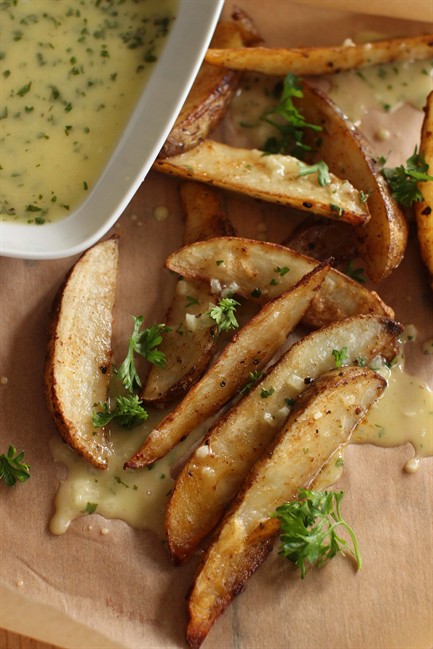Most of the foods we eat — even among those of us for whom eating is a career — pass our lips and leave not even a fleeting memory. Most foods.

But then there are those that linger not just on our tongues, but in our minds. Perhaps by association of a time or place or person, or simply by the power of their own deliciousness. Somehow these foods take on another life for us.
Over the years, a handful of such foods have entered my life. My great grandmother’s rustic pork pate. My mother’s spanakopita. The sunflower seed risotto I ate at a small restaurant in Copenhagen last spring. The sinfully rich liverwurst spread thickly on sourdough that was my afterschool snack (paired with chocolate milk!) when I lived in Germany as a child.
And there is mojo sauce. The first time I tasted it was during Hurricane Katrina, which had forced an extended stay in Key West. We ate dinner at a dive where the meal itself was forgettable. But plopped onto the table was a basket of fried plantain chips and a bowl of mojo sauce for dipping. It was orange and slightly chunky and flecked with green.
I had no idea what it was, but as soon as I tried it I couldn’t stop eating it. It was sweet and sour and tangy and refreshing with just a tiny hint of heat. It was similar to a salsa, but so much more refreshing. The waitress explained that it was a Cuban-style mojo, for there actually are numerous mojo sauces from different parts of the world.

Get daily National news
Cuban mojo generally consists of minced garlic, onion and parsley that are mixed with sour orange juice, lime juice, olive oil and a hit of cumin. Traditionally, it is used to marinate pork or for dipping chips, such as plantains.
I wrote down the list of ingredients, but never made it. Until now. I found the card on which I’d scribbled the recipe and remembered that flavour. While plantain chips don’t necessarily excite me, this sauce did. So I decided to recreate it, but this time pair it with something big and bold — roasted potato wedges dusted with paprika. It’s a perfect combination.
___
MOJO SAUCE WITH PAPRIKA POTATOES
Sour orange juice is available online and at many ethnic markets. If you can’t find it, substitute regular orange juice, but add 2 tablespoons of lemon juice and reduce the orange juice by 2 tablespoons. The recipe makes extra mojo sauce, and you’ll be happy for it. Refrigerate the extra, then drizzle over grilled or roasted meat (especially pork) or vegetables.
Start to finish: 45 minutes
Servings: 8
- 6 medium russet potatoes
- Extra-virgin olive oil
- Kosher salt
- 2 teaspoons smoked paprika
- Ground black pepper
- 1/2 cup sour orange juice
- 1/4 cup lime juice
- 2 tablespoons lemon juice
- 1/2 small yellow onion, coarsely chopped
- 1/4 cup loosely packed fresh parsley
- 2 cloves garlic
- 1 teaspoon sugar
- 1/2 teaspoon ground cumin
Heat the oven to 400 F. Line a baking sheet with foil.
Cut each potato in half lengthwise, then cut each half lengthwise into about 5 wedges. Mound the wedges on the prepared baking sheet, then drizzle with 1 to 2 tablespoons of oil. Toss to coat evenly.
In a small bowl, mix together about 2 teaspoons salt, the paprika and 1 teaspoon of pepper. Sprinkle this evenly over the potato wedges, toss to coat evenly, then spread the potatoes in a single layer on the baking sheet. Bake the potato wedges for 40 minutes, turning the wedges halfway through.
Meanwhile, prepare the mojo sauce. In a blender, combine 1/2 cup of olive oil, sour orange juice, lime juice, lemon juice, onion, parsley, garlic, sugar and cumin. Pulse on and off for 30 seconds to 1 minute, or until the onion and parsley are very finely chopped, but not pureed. Taste, then season with salt and pepper, pulsing again to mix.
Serve the potato wedges with the mojo sauce on the side.
Nutrition information per serving: 230 calories; 140 calories from fat (61 per cent of total calories); 16 g fat (2 g saturated; 0 g trans fats); 0 mg cholesterol; 540 mg sodium; 23 g carbohydrate; 3 g fiber; 4 g sugar; 3 g protein.





Comments